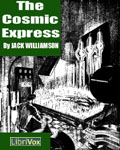
 The SFFaudio Podcast #543 – The Elf Trap by Francis Stevens; read by Josh Roseman.
The SFFaudio Podcast #543 – The Elf Trap by Francis Stevens; read by Josh Roseman.
This unabridged reading of the story (51 minutes) comes to us from the Protecting Project Pulp podcast is followed by a discussion of it.
Participants in the discussion include Jesse, Paul Weimer, Marissa VU, Terence Blake and Fred Heimbaugh
Talked about on today’s show:
Argosy, July 5, 1919, Fantastic Novels, Virgil Finlay, elvish or trappy, a fizzy wine, the colour of the wine is golden, yellow, gold, fin de sicile, The King In Yellow, the 1890s is yellow, the Yellow Peril, Yellow Journalism, the Gilded Age, yellow road, yellow mud, white robe, honeysuckle, very image based, the blue of her scarf, her brother is Elfo?, the invitation, white and silver, signifies for the opening and the closing scenes, the effect of the nested narratives, an outer outer outer narrator (Francis Stevens), old wives’ tales, recrudescence, related by a well known specialist in nervous diseases, the doubling or tripling, Dr. Locke?, prescription for me?, Wharton is the inner narrator, Theron Tademus, a listener, a comedy?, why don’t you read this to me?, Locke is a fool!, I don’t need to hear any more of this, the best part is coming up, a sex story, pretty chaste, two roads diverged, the negro caretaker, a yellow track and the other goes to Carcassonne, a Carolina mountain road, a confusion in his own mind, the gypsy camp vs. the artist’s camp, a tripling of reality, two Reading, Short And Deep podcast, The Road Not Taken by Robert Frost, The Rutted Road by H.P. Lovecraft, a very sly and sneaking poem, written for a friend, walking tours of England, the power of a poem, everybody has Fred’s take, everybody else doesn’t understand it, being playful, close to the message of The Elf Trap, he met death (or something), his physical form is destroyed, very Lovecraftian in the non-tentacled way, Celephaïs, The White Ship, happy or sad ending?, happy in the way people joining a cult are happy, evil or good or other, categories that can truly escape the good evil polarities, a valedictorian speech, I took the harder path, me looking down my nose at the snobs, career choices, very meta, more gloomy, Terence has heard the podcast on it, La Belle Dame Sans Merci by John Keats, 1820, Marissa is excluded, a gender queer fluid, they’re elves, that line from Aliens (1986) about Arcturian poontang, John Waterhouse, an interesting name, the best social interaction he’s ever had, so striking how, racist sounding, a bit of a dick, ripe for the picking, science vs. romanticism, he’s a microscopist (a cytologist), setting you up, life and feeling and warmth, science is basically a dead bug pinned to a card with a latin inscription underneath it, the limitations and the ugliness, the blindness of his scientific vision, the simplest interpretation, there’s a trap, the iron trap vs. the silver trap, it can re-get ya, a community, crafts (vs arts), a bit of fun, bringing an easel on a manhunt, hilarious, he could have been taken away by either group, the “rural ruins” kick (#ruralruins on Twitter), old wooden barns, collapsing barns, the appeal of melancholy ruins, now is the time to start photographing them, Southern Michigan, ex-urban, cornfield, the southern exposure, Minnesota, a going native story?, if Evan were here…, Typee by Herman Melville, beautiful clean, the white ivory flute, tending his disgusting grandmother, clean beautiful people, pretty colours, he needs somebody to break him out of his crabbed world of scientific examination, his passion for science, a tension, a fit of pique, she’s racist, terrible relationship, you’ve got to stay with me forever, that yellow dog, cur, mutt, mongrel, wearing the elf-glasses, a silver bell, everything that’s inviting him in is yellow, everything turns to gold instead of yellow, honey wild and manna dew, roots aren’t sweet, root beer tastes like medicine, it tastes like Chinese medicine, the etymology of drug, Buckley’s Mixture, relish sweet, this switch, everything that’s horrible becomes wonderful, he doesn’t have thought in his head, uh huh, and how much can you sell it for?, there’s something fundamentally wrong in his life, his Doctor’s name, how important names are, John Locke has the most beautiful signature, freshwater goldfish, dysteria, out of the loop, he almost escapes, his racism, their skin is whiter, he sees them in this white way, science sobers him, he’s very unwell, there’s something unwell in science at this time, mongrelizing, everybody’s suffering from Russia-gate-ism, how many rubles did you get paid?, here’s Nazism in 1919, racial theories and breeding programs, it was in the water and everybody was drinking the Kool-Aid, Irish travelers, the black servant, the airy fairy artist community, the sheriff with a posse, if Mr Jim Moon was here, midsummer, a nightwalk, a misreading, a morning walk, up all night, instead of through telescopes he’s looking through microscopes, Ambrose Bierce, Edgar Allan Poe, Pygmalion’s Spectacles by Stanley G. Weinbaum, Wonder Stories, June 1935, Galatea, The King In Yellow story that’s the opposite, Robert W. Chambers, The Elf King, belle epoch Paris, Virgil Finlay, he put on the glasses and fell in love with a dream, A Martian Odyssey, Fitz James O’Brien, The Diamond Lens, super-racism, The Atlantic (1858), the best microscope ever, falls in love with a little tiny lady, SCIENCE!, “Dysteria ciliata. Dysterius giganticus”, his love for the microscopic world, what the painter sees, seeing things as generalities on the surface vs. details in the lens, clumsiness, largeness, the anvil, Tolkien elves, frills and paisley, the blending of crafts and arts, William Morris, The King Of Elfland’s Daughter by Lord Dunsany, a reaction against science, poems about butterflies, you can love science AND poetry, William Blake, double vision, Auguries Of Innocence by William Blake, behind that is a veil, a hidden life of their own, Theron learns double vision, the elves inside the gypsies, a whole world, there Elva is blind, twofold vision, monsters that want eat him and liberators who want to free him, what does he bring to the table?, culture and community, 37 year old professor, infertility, outsiders, his charismatic attitude?, he brings novelty, something fresh and different, an Elva shaped hole, time is different for her, telepathically grooming Wharton, soulless, he’s lost his soul, big clumsy hulking brutes, an outsider without a soul, indeterminate, maybe they trapped him because he was trappable, is she a Scientologist, Projecting Project Pulp, Mech Muse, too early in podcasting?, more audiobooks, if Fred follows through, Unseen, Unfeared by Francis Stevens, spiritual themes, blogs are good but suppressed by Google, Tellers Of Weird Tales, Terence E. Hanley, death dealing shells, light over darkness, dark fantasy, a 21st century and academic conceit, one of the simplest of Stevens stories, built like a puzzle box, relativity, analytic cubism, where lies reality, a happy ending?, a pleasant reading experience, could have been written only by a woman, a deeper meaning in the man’s name, Jesse’s theory, Theron Tademus, tall?, hunter?, animal, tadpole, mouse, tall tailed mouse, mousetrap, she’s playing with it, pointing, the hunter and the hunted, not necessarily a happy ending, we praise thee oh god, he trusts science, he trusts her, he loses his last name in her world, they need some tall genes, one good name was good enough for one good person, a coordinate system, binomial nomenclature, Carcosa?, fantasy engaging with science fiction, Brigadoon, he has never danced or loved, beyond the veil, the deeper reality of the spirit, love and art triumph over materialism, the sky blue scarf, you’re all alike, you love is for gold (or freedom), she enslaves people, saved from science, his red notebook, looking at flowers in the forest with your girlfriend, beckoning him, driving Jesse mad, Carcassonne is a famous tourist trap, a medieval walled town, the tabletop game, it’s a trap, traps can be beautiful, a Florida based Star Wars Disney park, $40 light-saber, the rural ruins of Star Wars, tourist ruins, dinosaur ruins, South Dakota, Rapid City, north of Mount Rushmore, the Blue Ridge Mountains, there is in Kentucky, about as rural-ruiny as it can get, did she go there?, is this a true story, Carcassonne post office, a train stop maybe, America is filled with failed towns, Carcassonne Road, Carcassonne Community center, trampoline and a pool, an unincorporated village, if you squint and take off your classes, once every hundred years, if you’re Blakeian enough you can see it, there’s a guy who saw things differently, angels in the fields with the workers, something pagan about Elva, the Cathars, Kingsport, took the train into Asheville, something happened, I want to believe, Thousand Sticks, Mount Blackmore, American flag, Google Maps was magic, guess where in the world, the signage is in Spanish, we have magical powers our parents didn’t have, in the per-internet age, the state library in the capital of West Virginia, wait for the internet, lost and suppressed by google, if you know the address (the magic word) you can find it on the WayBackmachine, Protecting Project Pulp, Friend Island, a male reporter, women control the world, the grim and gritty sea-side tea house, an old sailoress, the only ships are trading ships or peace ships, shipwrecked on a man on an island and the island is female, Mother Nature is angry, funny on purpose, we need a president, Margaret Thatcher wasn’t that good, Hillary Clinton, policies and intentions matter, what is he basing that on?, hello Keats, much more arguable, male gazing, if you read it as a subversive ending, femme fatale, Black Widow (1987), Bound (1996), if it were written by, squamous squalid, not enough degeneration, love of place, very subtle, entertaining, so well put together, this story is cool, all that nesting of reality, it doesn’t tell you this is what happened, something artificial about the outer narrator, why do you need these characters, Edith Wharton, to make it seem more journalistic, framing stuff, The Oval Portrait by Edgar Allan Poe, about 60% is framing (and its all front framed), a turreted room, armorial trophies and portraits, falling in love with a portrait, there’s no outer frame, all set-up, Jesse cant remember the name of Henry James, The Others (2001), The Turn Of The Screw, take it as journals like Lovecraft, My name is Jervas Dudley, framing as throat clearing, imagine this was true, we’ve been trained, The House On the Borderlands by William Hope Hodgson, Rene Girard, triangular desire, scapegoats, mimetic desire, taking on the object of desire of someone else, aggression, Trump, Peter Thiel, advertising and Facebook, this is how their manipulating, writing about advertising, they use it all day long, I wanna be like them, BMW ads, projecting yourself into the vehicle, “ultimate driving machine”, the object of desire, we keep changing sympathies, I have a story to tell, he had a story to tell, he tells it to another guy, lampshading, who are we sympathizing with, that complication, perspectivizing through, filtering through, Rashomon effect, three visions of the dog, The Blair Witch Project, Scooby Doo, the whole point is the Gothic explique, gothic time!,
THE chateau into which my valet had ventured to make forcible entrance, rather than permit me, in my desperately wounded condition, to pass a night in the open air, was one of those piles of commingled gloom and grandeur which have so long frowned among the Appennines, not less in fact than in the fancy of Mrs. Radcliffe.
Jesse’s amazing news, The Garden Of Forking Paths by Jorge Luis Borges, change the trend, if they’re so impatient, if you don’t hook them in the first paragraph they’re going to walk, the perception in publishing, a whole bunch of readers who liove the slow build, the publishers are enforcing that rule, its anti-science fiction, Inconstant Moon a line only written by Larry Niven (or Jerry Pournelle), that ending line, Footfall, the humans are more conquery and tankie, giant elephants, The Tower Of The Elephant by Robert E. Howard, an adulteration, why are we being told this, changing microscope magnifications, micrometer, a blurry chaos becomes crystal clear, The Outer Limits, Fitz James O’Brien’s The Wondersmith, How I Overcame My Gravity, What Was It?, a haunted boarding house, smoking opium in the backyard, an invisible creature, plaster of Paris, The Horla by Guy de Maupassant.


Posted by Jesse WillisBecome a Patron!

 With 9 volumes of short stories now out there’s no doubt there’s a plethora of SF listening available over on LibriVox.org. I love these collections, they have a good variety and not too much repetition …. oh wait, I take that last part back. It’s the constant repetition that is impairing these collections. LibriVoxateers, please stop recording Kurt Vonnegut’s 2BR02B. Otherwise, keep up the great work!
With 9 volumes of short stories now out there’s no doubt there’s a plethora of SF listening available over on LibriVox.org. I love these collections, they have a good variety and not too much repetition …. oh wait, I take that last part back. It’s the constant repetition that is impairing these collections. LibriVoxateers, please stop recording Kurt Vonnegut’s 2BR02B. Otherwise, keep up the great work!









